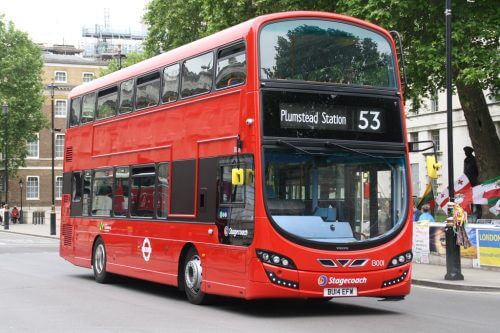Leaked information suggests planned cuts to three routes, while consultation reveals changes to a number of other services

Transport for London (TfL) is planning a raft of cuts to the capital’s route 53, 171 and 172 bus services, according to leaked information published by 853 London.
Stagecoach London-operated Route 53 currently runs from Plumstead, Woolwich, Charlton and Blackheath, passing through Deptford, Old Kent Road and Elephant and Castle to Whitehall.
The information suggests that the route will be cut back from March 2019, terminating at County Hall, in a bid to ‘reduce bus flows’ across Westminster Bridge and along Whitehall.
Route 53 was previously cut back in 2002, and links a number of areas of south-east London with the West End.
The 171, operated by Go-Ahead subsidiary London Central – which currently runs from Catford Bus Garage and Brockley to Holborn – may end up only running from Holborn to Elephant and Castle.
If the plans go ahead, the 172 from Brockley Rise – also run by London Central – is due to be cut back from Clerkenwell to Aldwych.
Besides cuts to the above routes, bus services elsewhere in the capital are also expected to be affected by the plans. TfL has suggested cutting route 15’s heritage Routemaster services, for example, proposing to only operate them on summer weekends and bank holidays.
A leaked TfL presentation on the plans suggested that over 30 routes in the city are currently ‘over-bussed,’ but the authority told 853 London that the proposals were still at an early stage.
Elizabeth Line consultation results
Meanwhile, TfL last week published the results of a public consultation on proposed changes to the capital’s buses for the opening of the Elizabeth Line rail service.
In west London, TfL plans to go ahead with the changes consulted on for routes 140/N140, X140, 223, N266, 391, 427, 697 and E3.
140 will be reduced in frequency to every eight minutes Monday to Saturday daytimes and every 12 minutes on Sundays and during the evening; it will also no longer run between Hayes & Harlington station and Heathrow Airport.
Routes 218, 266, 278, 306, 440, 698 and E10 will also be altered, with some amendments to the changes consulted on.
For example, route 218 will now run every 12 minutes Monday to Saturday daytime rather than every 10, and every 20 minutes during Sundays and evenings instead of 15.
E10 is set to receive 60-seater single-decker buses, although the route’s frequency will remain the same.
The introduction of the changes to routes 95, E5 and H32 will be delayed until new roads are available at the Southall Waterside (Gasworks) site, however.
Moving to south east London, TfL says it will go ahead with the changes as consulted on for routes 129, 161, 178, 291, 469, 472 and B11.
Route 129 will be extended to Lewisham from its current terminus at Greenwich town centre.
Routes 180 and 301 will also be altered to reflect consultation responses; route 180 will be run between Erith Quarry and North Greenwich, but will be rerouted between Charlton and North Greenwich via Bugsby’s Way instead of via Peartree Way, while route 301 will be introduced between Bexleyheath and Woolwich using double-decker buses, now running via Woolwich Road and New Road instead of via Knee Hill.
In the north east, changes to routes 25, 300, 330 and 474 will go ahead as previously outlined.
However, route 104 will now be split into two separate routes (104 and 304), 241 will no longer be extended and it’s expected that 497 will be introduced after the Elizabeth line is open and the Kings Park development is further progressed.
Demand for routes 174 and 256 will be kept under review, with the potential for increasing the frequency of the former and changing the latter to use double-deckers in future.
In all, the consultation received 2,706 responses – 2,664 from the public and 42 from stakeholders.

